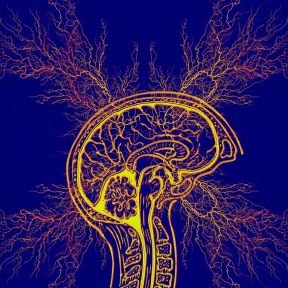ADHD and Cannabis. Recent studies have revealed the risks of cannabis for ADHD. Reviewed by Kaja Perina

KEY POINTS-
- About 90% of ADHD patients have additional conditions including oppositional behavior, drug abuse, & anxiety.
- An imbalance in dopaminergic neurotransmission may underlie aspects of the behavioral complications of ADHD.
- Cannabis produces a hypodopaminergic environment that might explain its potential as a therapy for ADHD.
- However, the administration of cannabis to young brains has numerous negative consequences to be considered.
Attention-deficit hyperactivity disorder (ADHD) is a widespread psychiatric disorder among children, that sometimes persists into adulthood. It is highly heritable, but the definitive causes remain unknown. Roughly 2-12% of school-aged children have ADHD symptoms (a broad range due to controversies in diagnosing), and these symptoms continue into adulthood for about 60% of them. Children with ADHD show mood dysregulation and poor social functioning. About 90% of ADHD patients also have additional mental illnesses, with learning impairments, oppositional behavior, drug abuse disorders, and anxiety (Divyanshu et al., 2023). Imaging studies have revealed a range of neurodevelopment problems in patients with ADHD, including changes in the structural organization of the brain that may underlie the reduced level of activity in their frontal, parietal and temporal cortices.

The Role of Dopamine
An imbalance in dopaminergic neurotransmission may underlie many aspects of these behavioral and physiological complications. Neuroimaging studies have shown that ADHD patients inherit significantly fewer dopamine transporter proteins in their basal ganglia, leading to a condition where too much dopamine collects outside the neuron. The purpose of the dopamine transporter is to remove dopamine from the synaptic cleft after it is released from the neuron, thus terminating its action.
People with ADHD are about three times more likely to use cannabis (Divyanshu et al., 2023). Their attraction to cannabis may be due to the effects of THC on dopamine function. Studies have shown that THC produces a hypodopaminergic (too little dopamine) environment in the brain. This might explain the claims that medical cannabis is a potential alternative therapy for adult ADHD.
Cannabis and Cognitive Function
The administration of cannabis to young brains has numerous negative consequences. Regular cannabis use during adolescence may lead to diminished verbal and working memory abilities and an inability to pay attention for long periods of time, such as during class. Teenage cannabis use may lead to significant changes in the function of brain regions that control motivation, impulsivity, processing rewards, reaction inhibition, and thought processing speed. Recent anatomical studies have reported that the amount of gray matter in the hippocampus and amygdala, regions involved in controlling mood, of young adults who use cannabis heavily is reduced in relation to their use.
Interestingly, the timing of the first use of cannabis by a patient is not linked to presence of their ADHD symptoms. However, simply having ADHD symptoms might be a risk factor for the continued use of cannabis. One recent study reported that men with ADHD, but not women, had a strong correlation between increased marijuana use and an increase inability to pay sustained attention.
Sleep disturbance is also a frequent justification for cannabis use among people who have been diagnosed with ADHD. Unfortunately, research suggests that people become tolerant to cannabis' short-term sleep benefits. This tolerance may lead to increased use and the risk of cannabis-related behavioral problems.
Like the general population, adults with ADHD symptoms frequently cite depressed mood as their reason for using cannabis daily. However, there might be another reason; according to one study, consuming high doses of cannabis reduces the need for ADHD medication. This effect may be related to the changes in dopamine released produced by cannabis. Overall, the perceived risk by patients is relatively low. Online conversations show that cannabis is believed to be beneficial for ADHD. Another important pervasive issue: patients often believe that cannabis is less dangerous than many of their medications.
- Questions and Answers
- Opinion
- Motivational and Inspiring Story
- Technology
- Live and Let live
- Focus
- Geopolitics
- Military-Arms/Equipment
- Sécurité
- Economy
- Beasts of Nations
- Machine Tools-The “Mother Industry”
- Art
- Causes
- Crafts
- Dance
- Drinks
- Film/Movie
- Fitness
- Food
- Jeux
- Gardening
- Health
- Domicile
- Literature
- Music
- Networking
- Autre
- Party
- Religion
- Shopping
- Sports
- Theater
- Health and Wellness
- News
- Culture

